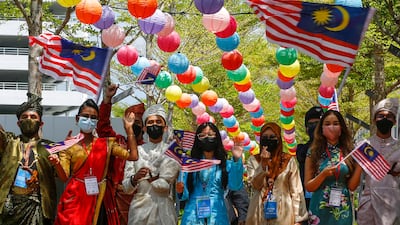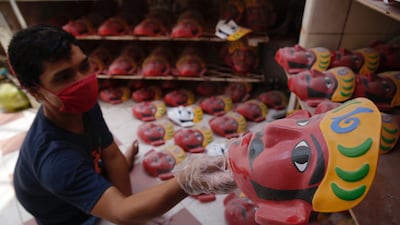Follow the latest updates on the Covid-19 pandemic here
A key dilemma during the Covid-19 pandemic has been balancing public health with the needs of the economy.
Strict border controls and the closure of retail outlets and restaurants can keep infection rates down — but at significant financial cost.
In the absence of lockdown controls, health systems in some countries have become overwhelmed and death rates have spiralled.
Here we consider the contrasting strategies being taken by governments in South-East and East Asia.
Singapore ditches elimination policy
This island nation has kept its Covid-19 death rate down to about 70 through strict control measures, but with vaccination rates high, in June it said it was abandoning its zero-tolerance approach and transitioning to living with the coronavirus.
The loosening of controls has seen infection and death rates increase, causing the reimposition of some lockdown measures.
“I think the Singapore government has done the right thing,” says Professor Yanzhong Huang, a senior fellow for global health at the Council on Foreign Relations in the US.
Council on Foreign Relations
“They recognised zero-tolerance is not sustainable. Given the current pandemic, the situation worldwide, it’s wise to learn to live with the virus.”
He says the country’s “contingent approach”, in which restrictions are retightened as necessary, allows the country to make progress towards opening up, while limiting infection rate increases.
About four-fifths of Singapore’s population is fully vaccinated, and although infection rates have shot up — recently there was a record of 1,457 cases in a single day — more than 98 per cent of patients reportedly have no or mild symptoms.
Are Thailand, Malaysia, Indonesia and Vietnam right to loosen restrictions?
These South-East Asian countries have announced plans to open up their economies or at least part of their tourism sectors after strict regional or national lockdowns.
This is despite low vaccination rates in Vietnam, Indonesia and Thailand, with less than 25 per cent of the population fully jabbed.
About 59 per cent of Malaysians are fully vaccinated.

Also, while infection rates in all four countries have fallen after peaks caused by the Delta variant’s arrival about three months ago, they remain high in Vietnam, Thailand and Malaysia, with case numbers in each close to or above 10,000 a day.
Vietnam is looking to reopen its tourist island of Phu Quoc, but this is being delayed until November because of low vaccination rates.
Malaysia has loosened controls on domestic tourism, while Thailand and Indonesia are set to welcome more foreign visitors from October, deciding that they cannot wait until vaccination rates improve significantly.
There are particular dangers in opening up, says Prof Huang, in countries without robust health systems, as hospitals could easily become overwhelmed if cases spike.
“They should probably wait until they have achieved a higher vaccination rate — at least 50 per cent of the population being fully vaccinated,” says Prof Huang, who is director of the Centre for Global Health Studies at Seton Hall University in the US.
How long can Hong Kong keep up zero-Covid approach?
While several Asian countries have already loosened or will loosen restrictions, the Chinese special administrative region of Hong Kong is, for now, sticking to a zero tolerance approach of the kind Singapore has left behind.
Incoming travellers have to quarantine at their own expense in a government-approved facility for as long as three weeks, a policy that is justified, officials say, because positive cases have emerged even after 14 days of isolation.
From many countries entry to people who are not Hong Kong residents is banned, although restrictions within the territory are relatively light, including compulsory mask wearing in some settings and a prohibition on large gatherings.
The strict entry controls are having their desired effect, because Hong Kong, which has had slightly more than 200 deaths, is recording just a few cases a day.

Amid continued concern from the business community about restrictions, earlier this month a slight loosening came into effect, with limited numbers of non-residents allowed to enter quarantine-free each day from Macau and the Chinese mainland.
Hong Kong’s overall vaccination rate is about 60 per cent, but may be as little as half this among older people, making it more difficult for officials to contemplate loosening restrictions in the way Singapore has.
Officials have indicated that, if they can improve vaccination rates, they may “adjust” the current strategy.
While not likely to continue indefinitely, the zero-tolerance approach will probably remain for the moment, says Prof Huang.
“Maybe after mainland China changes its approach, Hong Kong will follow suit,” he says.








